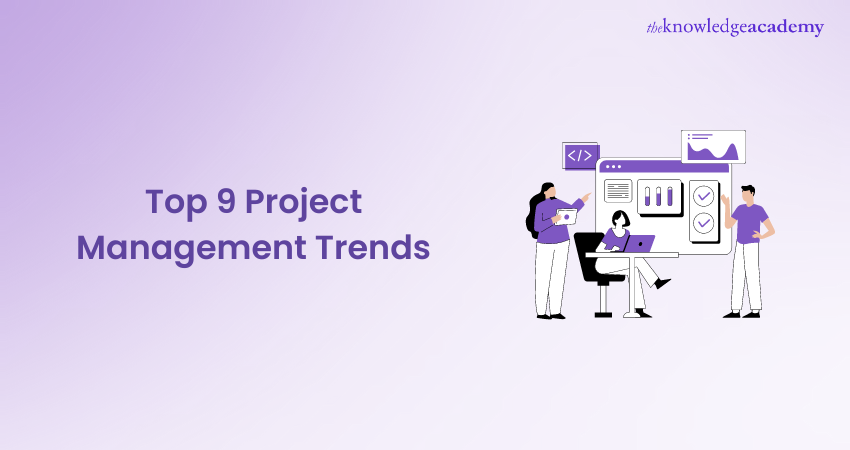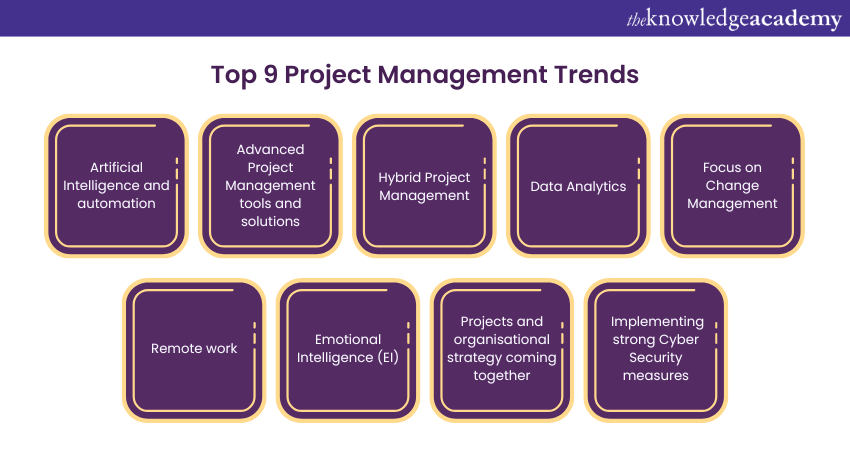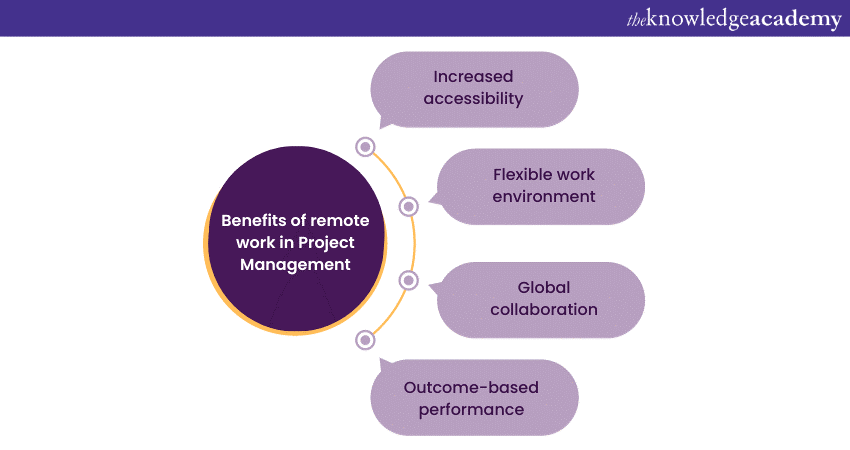We may not have the course you’re looking for. If you enquire or give us a call on 01344203999 and speak to our training experts, we may still be able to help with your training requirements.
Training Outcomes Within Your Budget!
We ensure quality, budget-alignment, and timely delivery by our expert instructors.

In Project Management, change is constant, and staying ahead of the curve is the key to success. The world of Project Management is experiencing a transformation driven by various influential trends. From the magic of Artificial Intelligence to a more flexible approach called Hybrid Project Management, these Project Management Trends are shaping how projects are executed.
Project Management is essential for any organisation that wants to succeed and deliver value. But Project Management is not fixed. It changes to meet the new demands and challenges of the business world. That’s why you need to know the latest trends. In this blog, you will discover the top 8 Project Management Trends that will influence the future of work.
Table of Contents
1) Top 9 Project Management Trends
a) Artificial Intelligence and automation
b) Advanced Project Management tools and solutions
c) Hybrid Project Management
d) Data Analytics
e) Focus on Change Management
f) Remote work
g) Emotional Intelligence (EI)
h) Projects and organisational strategy coming together
i) Implementing strong Cyber Security measures
2) Conclusion
Top 9 Project Management Trends
From harnessing the power of Artificial Intelligence to implementing Cyber Security measures, let's explore the top 8 Project Management Trends. Discover the significant benefits they bring to the table, driving this transformation in Project Management.

Artificial Intelligence and automation
Artificial Intelligence (AI) is the ability of machines or software to perform tasks that usually require human intelligence, such as reasoning, learning, decision-making, and problem-solving. AI is becoming increasingly relevant and influential in Project Management, as it can help Project Managers and teams achieve their goals more efficiently and effectively.
Some of the ways that AI can transform Project Management are:
a) Spurring automation: AI can automate many administrative and repetitive tasks in Project Management, such as scheduling, reporting, updating, and communicating.
b) Greater emphasis on Data Analytics: AI can leverage the vast amount of data generated by projects to provide insights, predictions, and recommendations.
c) Optimisation of resources: AI can help Project Managers allocate and manage resources, such as budget, time, scope, quality, and human capital, more effectively.
d) Focus on monitoring and testing: AI can help Project Managers ensure the quality and reliability of their project deliverables by facilitating and enhancing the monitoring and testing processes.
Advanced Project Management tools and solutions
Advanced Project Management tools and solutions have gone beyond basic planning and scheduling. They now incorporate features such as real-time collaboration, cloud-based accessibility, and AI-driven automation.
These tools enhance communication and collaboration among team members, stakeholders, and clients. For instance, Cloud-based Project Management platforms allow team members to access project data and updates from anywhere. This can ensure real-time information sharing. AI features can help Project Managers make data-driven decisions and automate routine tasks, thus boosting productivity. The following are some of the benefits of using these tools:
a) Efficient collaboration: Advanced tools facilitate efficient collaboration among team members, stakeholders, and clients by providing real-time communication and information sharing.
b) Automation: AI-driven features automate routine tasks, such as data entry and reporting. Thus, they reduce administrative workload and allow Project Managers to focus on strategic planning.
c) Real-time reporting: Cloud-based solutions offer real-time reporting and data access from anywhere. As a result, they ensure that all stakeholders have the most up-to-date project information.
d) Improved documentation: Advanced tools often offer robust documentation capabilities. Thus, they help simplify project tracking and ensure that project details are well-documented for reference and analysis.
Master the art of successful Programme Management with Programme Management (PgM) Fundamentals Course and make your path to excellence!
Hybrid Project Management
Hybrid Project Management blends elements of traditional Waterfall and Agile methodologies. This approach provides a higher degree of flexibility, allowing Project Managers to tailor their approach according to the specific requirements of a project.
In practice, Hybrid Project Management allows Project Managers to tailor their approach to suit the project's unique requirements. Some phases of the project may follow a Waterfall approach, while others employ Agile Project Management Principles. This hybrid approach allows for a more fluid response to changing conditions and customer feedback. The following are some benefits of using this approach:
a) Flexibility: Hybrid Project Management acknowledges that not all projects fit neatly into a single methodology. It allows for adaptability and responsiveness to changing requirements.
b) Optimised resource utilisation: The ability to combine Waterfall's structured planning with Agile's iterative development can optimise resource allocation. It ensures that project teams work on the most valuable tasks at the right time.
c) Improved collaboration: By incorporating Agile practices, hybrid projects tend to have a more collaborative atmosphere, with open communication and an emphasis on client feedback.
d) Risk mitigation: Hybrid approaches can help Project Managers mitigate risks by providing structured planning while allowing for changes based on real-time data.
Data Analytics
Data Analytics has emerged as a powerful tool in Project Management. It enables Project Managers to make data-driven decisions and optimise performance.
For instance, Data Analytics can help Project Managers identify recurring bottlenecks in the project process. They can also monitor the performance of project teams and adjust resource allocation accordingly. Predictive analytics can be used to forecast project completion dates and budget variances. The following are some of the benefits of using Data Analytics:
a) Data-driven decisions: Data Analytics allows Project Managers to make informed decisions based on historical data, performance trends, and risk assessment. This can lead to improved project outcomes.
b) Resource allocation: Analysing project data can help Project Managers identify resource bottlenecks. As a result, they can efficiently allocate resources and prevent project delays.
c) Performance monitoring: Data Analytics can be used to monitor the performance of project teams. It can help highlight the areas where improvements are needed and ensure that projects stay on track.
d) Predictive analysis: Predictive analytics can forecast project completion dates and budget variances. Thus, Project Managers can plan and react proactively to potential issues.
Focus on Change Management
Focus on Change Management is another Project Management Trend that involves identifying, assessing, and implementing strategies to minimise project disruption caused by changes in the internal or external environment. Change Management helps Project Managers and teams stay agile and respond quickly to any circumstance.
Some of the benefits of focusing on Change Management are:
a) Improved project outcomes: Change Management can help Project Managers align their project goals, scope, and deliverables with the changing needs and expectations of their stakeholders, customers, and users.
b) Enhanced team performance: Change Management can help Project Managers communicate and collaborate effectively with their project teams and other project parties and foster a culture of trust, transparency, and accountability.
c) Increased stakeholder satisfaction: Change Management can help Project Managers engage and involve their stakeholders throughout the project lifecycle and ensure that their feedback, input, and concerns are addressed and incorporated.
d) Reduced project costs and time: Change Management can help Project Managers optimise their project resources, such as budget, time, scope, and quality, and avoid unnecessary or excessive changes, rework, or waste.
Unlock your path to success with our Introduction To Project Management Certification Course and become a Project Management pro!
Remote work
Remote work has become a major trend, further accelerated by the COVID-19 pandemic. Project Managers must adapt to this shift and ensure that remote teams remain connected and productive.
Virtual collaboration tools, like video conferencing and collaborative software, have become indispensable for maintaining team cohesion and productivity in remote work settings. Moreover, Project Managers must now focus on outcome-based performance measurements rather than traditional office presence, which emphasises the importance of clearly defined project objectives and key performance indicators. The benefits of remote work in Project Management include the following:

a) Increased accessibility: Remote work allows for broader access to a diverse talent pool. It enables Project Managers to assemble the best teams regardless of geographical location.
b) Flexible work environment: Remote work promotes flexibility, which can lead to improved work-life balance and increased job satisfaction among team members.
c) Global collaboration: Remote work fosters global collaboration, as team members and stakeholders from different regions and time zones can participate.
d) Outcome-based performance: Remote work shifts the focus from office presence to outcome-based performance, which can lead to more results-oriented project teams.
Emotional Intelligence (EI)
Emotional intelligence (EI) is the ability to perceive, use, understand, manage, and handle one’s own and others' emotions. It is a key skill for Project Managers, as it helps them build and maintain strong relationships, manage stress, make effective decisions, and lead change in complex and dynamic environments.
EI enables Project Managers to cope with remote work, Artificial Intelligence, diversity, and innovation challenges. Some of the benefits of EI for Project Management are:
a) Improved communication and collaboration: EI helps Project Managers communicate clearly and empathetically with their team members, stakeholders, and clients, regardless of location, culture, or personality.
b) Enhanced decision-making and problem-solving: EI help Project Managers analyse complex data, weigh multiple options, and consider the impact of their decisions on themselves and others.
c) Increased productivity and performance: EI helps Project Managers manage their and their team’s emotions, stress, and motivation. It also helps them set realistic and achievable goals, prioritise tasks, delegate responsibilities, and monitor progress.
d) Higher customer satisfaction and loyalty: EI helps Project Managers understand and meet customers' needs and expectations and deliver high-quality products and services.
Projects and organisational strategy coming together
Projects and organisational strategy coming together refers to aligning project goals and activities with the organisation's larger strategic vision and objectives. This helps ensure the projects are relevant, valuable, and impactful for the organisation’s success.
Some of the benefits of aligning projects and organisational strategy are:
a) Improved resource allocation and prioritisation: By aligning projects and organisational strategy, Project Managers can better allocate and prioritise the resources, time, and budget for the most important and urgent projects contributing to the strategic goals.
b) Increased stakeholder engagement and satisfaction: By aligning projects and organisational strategy, Project Managers can communicate more effectively and transparently with the stakeholders, such as senior management, customers, and employees, about the purpose, scope, and expected outcomes of the projects.
c) Enhanced innovation and competitiveness: By aligning projects and organisational strategy, Project Managers can foster a culture of innovation and learning where new ideas, opportunities, and challenges are welcomed and explored.
d) Higher project success and organisational performance: By aligning projects and organisational strategy, Project Managers can measure and evaluate the project results and benefits of the strategic goals and indicators.
Implementing strong Cyber Security measures
This trend refers to adopting and enforcing robust Cyber Security policies and practices to protect organisations' projects, data, and reputations from increasingly frequent and sophisticated cyberattacks. Project Managers must proactively adopt strong Cyber Security measures to safeguard their projects, stakeholders, and intellectual property.
Some of the benefits of implementing strong Cyber Security measures are:
a) Reduced risk of data breaches and losses: Cyber Security safeguards project data, preserving quality, scope, budget, or schedule integrity for Project Managers.
b) Enhanced trust and reputation: Implementation of strong Cyber Security displays commitment, fostering positive stakeholder relationships for Project Managers.
c) Improved efficiency and productivity: Comprehensive Cyber Security measures streamline processes, ensuring seamless operation and enhancing overall efficiency and productivity for Project Managers.
d) Increased innovation and competitiveness: Robust Cyber Security promotes a culture of exploration, testing new ideas, and fostering innovation for Project Managers.Unlock your potential as a Project Manager with our comprehensive Project Management Courses - Sign up now!
Conclusion
The nine key Project Management Trends are not isolated but interconnected, forming a complex web of modern Project Management practices. Embracing them and understanding their benefits is vital for Project Managers looking to navigate the evolving landscape effectively. The future of Project Management is a dynamic blend of cutting-edge technology, interpersonal skills, and a commitment to sustainability and security.
Unlock your potential with our Project Management Masterclass and lead with confidence – join now!
Frequently Asked Questions

There are many resources and platforms that offer insights into upcoming Project Management Trends, such as:
a) Blogs and websites by reputable organisations and experts
b) Reports and surveys by research firms and industry associations
c) Online courses and certifications by accredited providers

Staying updated on Project Management Trends can enhance your job prospects by:
a) Helping you acquire the skills and competencies that employers are looking for
b) Enabling you to adapt to the changing needs and expectations
c) Demonstrating your commitment to continuous learning and improvement

The Knowledge Academy takes global learning to new heights, offering over 30,000 online courses across 490+ locations in 220 countries. This expansive reach ensures accessibility and convenience for learners worldwide.
Alongside our diverse Online Course Catalogue, encompassing 17 major categories, we go the extra mile by providing a plethora of free educational Online Resources like News updates, Blogs, videos, webinars, and interview questions. Tailoring learning experiences further, professionals can maximise value with customisable Course Bundles of TKA.

The Knowledge Academy’s Knowledge Pass, a prepaid voucher, adds another layer of flexibility, allowing course bookings over a 12-month period. Join us on a journey where education knows no bounds.

The Knowledge Academy offers various Project Management Courses, including Introduction to Project Management Certification Course and Project Management Masterclass. These courses cater to different skill levels, providing comprehensive insights into Project Management.
Our Project Management Blogs cover a range of topics related to Project Management Skills, offering valuable resources, best practices, and industry insights. Whether you are a beginner or looking to advance your skills in Project Management, The Knowledge Academy's diverse courses and informative blogs have you covered.
Upcoming Project Management Resources Batches & Dates
Date
 Project Management Certification Course
Project Management Certification Course
Fri 17th May 2024
Fri 21st Jun 2024
Fri 19th Jul 2024
Fri 16th Aug 2024
Fri 13th Sep 2024
Fri 11th Oct 2024
Fri 8th Nov 2024
Fri 13th Dec 2024







 Top Rated Course
Top Rated Course



 If you wish to make any changes to your course, please
If you wish to make any changes to your course, please


